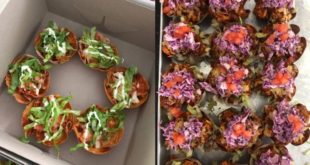Chicken breasts are popular in the fitness realm due to their low caloric count and high protein content. Another reason for their likability is in their convenience, as it only takes 15 minutes to cook one well.
But for too-busy white-collar workers who still wish to be fit and healthy, cooking it can be a hassle on its own.
Hence, TearNEat wants to leverage off this market of white-collar gym rates who need their protein fix in a quick and convenient way.
All In The Name
The idea of TearNEat came about when its founder, Valen, tasked his chef at The Pokemist one day to develop a ready-to-go chicken breast during his free time, which he succeeded in.
Valen then brought it to the gym to snack on after a workout, which got the attention of other gym-goers who wanted to get their hands on it too.
That was the push he and his partners needed to start this brand.

TearNEat is a meal prep company that delivers ready-to-eat chicken breasts which are pre-marinated and fully cooked so customers will only have to reheat it and tear off its packaging before consumption.
Think of it like a protein bar that’s essentially 100g of pure lean meat. Its small size means customers can carry them around in their work, gym, or handbags, too.
Not Chickening Out
Much like most F&B businesses who face the initial challenge of getting their name out there with limited funds, the team tackled this by sliding into DMs.
The team individually reached out to Instagram fitness influencers by messaging them on Instagram to introduce the TearNEat brand and gave out free samples for them to try out.
To their surprise, most of the influencers got back with their interest in working with the brand.
Valen then scheduled meet-ups so he could better explain the brand’s goals and what they were all about.
Since launching in August this year, TearNEat has sold roughly 3,000 pieces of chicken breasts within its first month, and is growing steadily today with hopes to sell 10,000 pieces a month.

However, it’s worth noting that TearNEat was able to reach that number of sales due to the nature of how they sell their products. There is a minimum purchase requirement of 10 pieces at a time, which will cost you RM180.
Compare that to buying raw from the grocery store where you could get a 2kg pack of frozen chicken breasts at RM25, and RM18 for a single chicken breast seems like a stretch to an average consumer.
But to Valen, their pricing structure is justified if compared to eating out at a restaurant, where one would spend within that range for a main course.
“If you compare self-prepping to buying our chicken breast, of course, the numbers will show that it’s not cost-effective,” he said.
“But then again, people who purchase our products usually have very busy schedules and don’t know how to make their chicken breast that doesn’t taste like dried out meat.”
This is why TearNEat’s products are marinated with local flavours like Sichuan Mala, Spicy Paprika, or BBQ for taste and moisture.
Single-Use Packaging

Because the chicken is already fully cooked, customers would just have to follow the product’s instructions to reheat it by pan-frying, sous vide, or microwaving so it doesn’t come out dry.
Aside from pan-frying, the other methods can be done without taking the chicken out of its high-temperature resistant packaging.
This heat-proof packaging is what helps them stand out from other cooked chicken breast delivery services like Heaven Eat, for example.
But with each packaging only holding one piece of chicken breast, I’d imagine that this can be extremely wasteful. Convenience aside, customers are throwing them away after a single use.
Valen told Vulcan Post that they are in fact in the process of searching for alternatives to plastics, with one option being biodegradable plastic.
Of course, packaging them in biodegradable plastic may mean giving up on its convenience of being microwavable. Thus, one suggestion is to deliver them in microwave-safe containers, whether plastic or not.
For example, Essence Kitchen, a Malaysian startup that preps cooked confinement meals for mothers, packs their food in glass containers for customers.
Every time a customer orders a new batch of meals from them, they simply return the previous set of containers via courier service for the next meals’ packaging.
While this may be less convenient in terms of space-saving in gym bags or handbags, it could be a reasonable compromise for fitness enthusiasts who are also environmentally-conscious.
It could also open up TearNEat to a new subset of customers out there who may be hesitant about the service due to the amount of single-use plastic waste generated.
Featured Image Credit: Valen, founder of TearNEat



